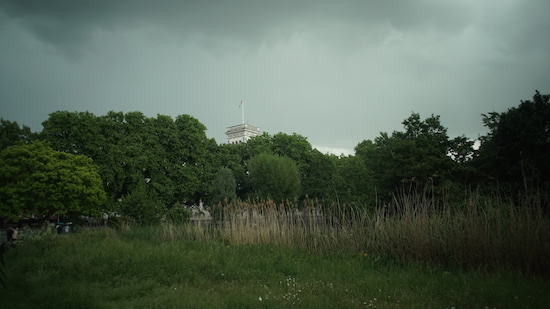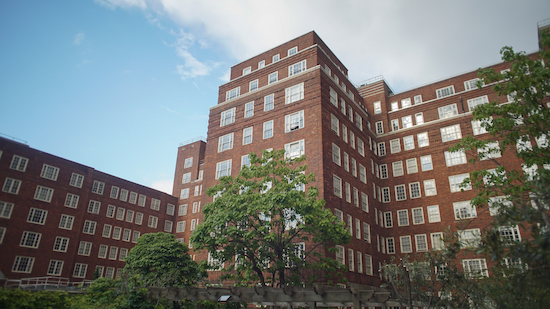Huw Lemmey in collaboration with Onyeka Igwe, Still from Ungentle, 2022, Photo: Morgan K. Spencer
Ungentle is a nature documentary. Its title scene presents an English pastoral setting, Bryn Terfel singing a version of George Butterworth’s poem ‘Is my team ploughing?’ It fluently cuts from rurality to a park, ironwork fences and carefully arranged planting as a representation of wilderness for a city setting. The narrator’s voice sits over the scene, but this is not Attenborough-esque. The animal observed in this film is the British Homosexual, and the tightly crafted script explores how this particular creature is deeply entangled in culture, deceit, place, and nature. Ungentle is a queer nature documentary.
The film is by Huw Lemmey in collaboration with Onyeka Igwe, developed with Studio Voltaire following a 2018 walking tour Lemmey led as part of Rainbow Aphorisms, a project in which the gallery presented the late David McDiarmid’s AIDS- and Queer-adjacent prints across South London. His route began at St. James’ Park and explored the complex relationships of sexuality and spycraft through London’s landscapes and cultural history – a walk which will be reprised in autumn.
It also a film extracted from broader research Lemmey is carrying out for a future book encompassing the same themes of spying and sexuality. For a creative working across various mediums – Lemmey has written three novels, publishes the weekly utopian drivel Substack, and co-presents the Bad Gays podcast – it’s interesting to see him explore film as a further form of communication, and using it poetically rather than as documentary.
“I realised that it’s through these creative forms that our sexual identity was shaped, not through documentaries … Books like Isherwood and the aestheticisation of identity is how gay men in England have told us the story of who they are to each other, so it seemed natural to do it a more creative way.”
“It could have been a novella. But with spy films and TV programmes, it felt natural to make a film,” Lemmey said to me when we spoke at Studio Voltaire before the opening of the show.

Huw Lemmey in collaboration with Onyeka Igwe, Still from Ungentle, 2022, Photo: Morgan K. Spencer
The casting of Ben Whishaw as a narrator, with his voice floating over Onyeka Igwe’s 16mm filming, works. It helps the viewer into a recognisable space – Whishaw’s RP accent, 007 history, and status as an out actor all help set the tone of both character and conventions. But it’s more than a fictional drama. Lemmey and Igwe poetically explore the subject deeply with an academic rigour and creative play.
In broad terms, Ungentle is a film of eight short chapters, chronologically following the story of Whishaw’s unnamed character, an imaginary persona crafted from deep research on characters like Anthony Blunt, Guy Burgess, and the other Cambridge Five Spy Ring members. We never see him, but Whishaw takes us on a journey through his version of his story, entwining identity, politics, and lust. It is a film about boundaries. “Everything inside is one thing, everything outside, quite another,” the narrator says. He reflects upon identity and a homosexual secrecy revealed only to those deemed likeminded, others of the same bent who might perform similar codes and gestures, choreographed over generations of social seclusion.
Lemmey explains, “gay men can slip into the mainstream and yet they have their own community and culture apart from it, and so this idea of being above and being aware, but one step apart from the rest of society.” Whishaw’s character lives this, constantly slipping through boundaries, reading and performing fluently on both sides: homo and hetero, public and secret, nature and construct, real and performance. Class boundaries are certainly present. The British boys’ club and its culturally engrained requirements for membership: “Good schools, good families, good Oxbridge types … We were simply exactly the sort of men on whom the Empire had always relied,” explains the protagonist when describing his unvetted climb of the establishment tree.

Huw Lemmey in collaboration with Onyeka Igwe, Still from Ungentle, 2022, Photo: Morgan K. Spencer
A recurring boundary is that of St. James’ Park. Whishaw speaks of it as “a kind of purgatory … manicured for people of the daytime.” After hours it is a space for secluded recreation, one which renounces the manicured in favour of the mulch and thickets punctuated by desire-line paths leading from the street-lit pavements. Surrounded on each side by royalty, politics, military, and nightlife, it is a space where members of each world come together in the nighttime, “that secret bond between men.”
It is also a film about codes, and a homosexual reading of place and people with deeply embedded cultural knowledge, knowing how to exist within a crowd but remain apart from it. Lemmey’s script builds on a history of gay literature exploring this, he explains, “You have people like Isherwood and how he feels that I am a camera, observing these things. As part of this gay effect that emerges, that you are somehow hyper-observer of society because everyone thinks you’re part of it, but you are constantly reading for threats and potential sexual partners in a different way.” The protagonist considers this situational presence, conflating his sex and spy lives: “I became very good at keeping secrets. I became very good at reading the codes. I became very good at saying one thing, and believing another. I might say that my NKVD handler would have been very pleased with my spycraft, but for that matter, so might my lovers.”
Over the film, the spy is recruited into his identities. A memorable sexual encounter in the riverbank as a sixteen-year-old, groomed as a spy at university in Cambridge, and then employed into the secret service in 1938. “He seduced me, but let me think that I had seduced him,” Whishaw recalls of his initiation into the Spy Ring, a clandestine comradeship of British agents acting for the Communist NKVD. The script folds the sexual with political, and at times it seems as if not only the viewer but perhaps the protagonist confuses one with the other, an identity involving so much concealing and revealing that, like flora and fauna coexisting in the night of St. James’ Park, it cannot now be untangled.
“The whole film is between two codes, the whole urban to rural, patriotic to seditious, natural heterosexual to natural homosexual. It’s about these binaries,” Lemmey states. But it feels as if they exist as counterpoints where the real truth is the murkiness between binaries – the sun setting, the threshold of the hedge, communism meeting capitalism.
As a filmmaker, Onyeka Igwe has an ongoing interest in landscape and how, as well as flora, soil nourishes politics and culture. The Jarman Award shortlisted artist is currently exhibiting The Miracle on George Green (2022) upon the manicured, controlled path of New York’s Highline, a suitable foil for a work exploring the traditions of British commons, collectively owned land used by and for communities.
For Lemmey, her camera lingers over nature. Frames suggesting a rural picturesque slowly pan to reveal constructed urban nature, as John Nash designed St. James’ Park to picturesque rules to simulate rurality in the city. Her camerawork progresses and evolves, reflecting the narrative – from early pastoral innocence and slowness, to urban eavesdropping and voyeurism, then later anxiety and fear as the handheld camera races through the courtyard gardens of Dolphin Square, the Pimlico flats once used by MI5 and long home to spies, politicians, and debauchery.
Within its thirty-five minutes, Ungentle packs a lot in. Linguistically and aesthetically it plays and puns with intelligence and evident care in its deeper research. At times it seems too fast. Codas without Whishaw’s breakneck biography and time to dwell solely in Igwe’s camerawork might have offered useful psychological pause. But its intensity is fascinating and pleasurable, and as an exploration of queer identity entangled with statehood, secrecy, and landscape, it is an excellent study of queer nature.
Ungentle by Huw Lemmey and Onyeka Igwe is at Studio Voltaire until 8 January 2023


